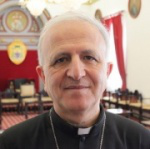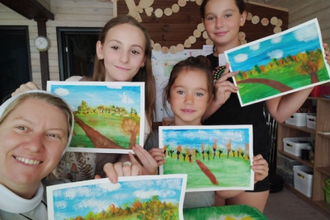Israel: new risk to Palestinian Christians' livelihoods

Bishop Shomali
Bishops in the Holy Land are rallying in defence of Christian families near Bethlehem who risk losing access to their olive groves and fruit farms if the Israeli government goes ahead with plans to extend its security wall. Plans to extend the West Bank Barrier – a security measure which separates the Palestinian territories from Israel – through the Cremisan Valley will affect the livelihoods of 58 families in the predominantly Christian village of Beit Jala.
The barrier will also cut through the grounds of a Salesian monastery and convent, as well as preventing an extension to the Church school, which has already received planning permission.
Speaking to Aid to the Church in Need, Bishop William Shomali, the Auxiliary Bishop of the Latin Patriarchate of Jerusalem, stressed that the key issue is that the barrier will deviate from the Green Line – the boundary between State of Israel and the Palestinian territories according to the 1949 armistice agreements.
Bishop Shomali said: “If Israel constructs the wall according to the 1949 borders, there will be no problem. It is [Israel’s] right. No one would object. The problem is that the route for Cremisan wall would be on Palestinian land.”
On 23 October, the Assembly of the Catholic Ordinaries of the Holy Land called on Israel to stop the construction of the “illegal wall” through the Cremisan Valley. The high-ranking clerics also expressed their fear that the planned extension of the West Bank Barrier would accelerate Christian emigration from the Holy Land.
Bishop Shomali expressed his hopes that diplomatic pressure might help resolve the issue. He said: “Any help coming from churches or governments to solve this issue would be a step to peace and tranquillity in the region.”The prelate also stated that it may be possible to find a route for the barrier that did not make such a major impact on the Church’s land or the villagers’ livelihoods.
“On another side, it is possible to build the wall near the tunnel roads, just in front of Gilo. In this case there will be less expropriation of land.”
A decision by the Israeli court is expected after February 2013, when the final pleas of the opposing parties will be heard.
Bishop Shomali told Aid to the Church in Need: “We want a decision that is just, not one that is designed to please the Church. There is the possibility that the court issues a fair verdict since Israeli courts are independent from politics.”
But the Bishop is concerned about the effect on the families if the extension goes ahead. He said: “We must then think about what we can do together with Caritas and other humanitarian organisations.” But the bishop added: “I am afraid our means will not be enough.”
The West Bank Barrier is a 420 mile (670km) long construct which Israel began building in and around the West Bank in 2002 after a wave of suicide bombings.
Christians in the Palestinian territories have reported major economic problems caused by the resulting restrictions on their movement.
According to a 2011 UN report, residents in some 70 villages in the West Bank were forced to take indirect routes, significantly lengthening their journeys to work places, colleges and medical facilities.
The security wall runs for about 80 percent of its length on the Palestinian side of the Green Line.


















